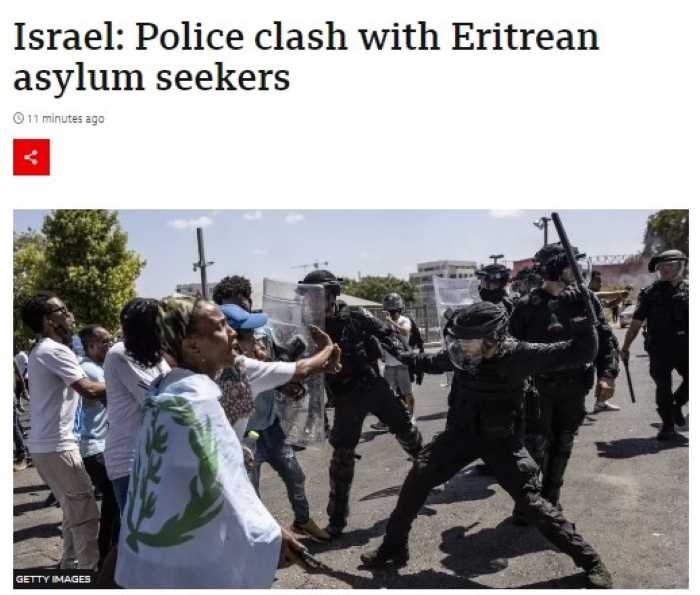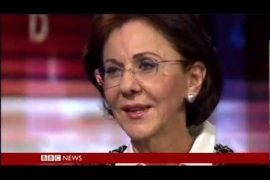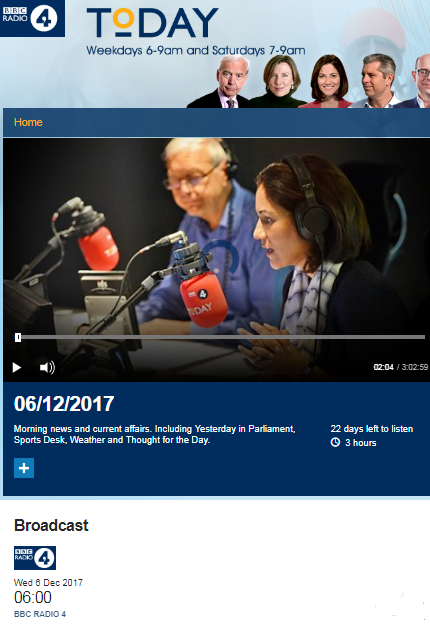On Saturday September 2nd violent clashes between groups of Eritrean migrants took place in Tel Aviv. As reported by the Times of Israel and other outlets, the trigger for that violence was an event organised by the Eritrean embassy.
“Over 150 people were reported injured in Tel Aviv Saturday, including some 15 seriously, as asylum seekers from Eritrea protesting against their government clashed with supporters of the regime, and as both groups clashed with police trying to impose order.
The chaos broke out amid a demonstration against an official Eritrean government event — marking the 30th anniversary of the current ruler’s rise to power. Opponents of the regime, decked in blue, arrived on the scene to demonstrate against supporters, who wore red. The rallies soon devolved into violence that lasted for several hours.
Eritreans from both sides faced off with construction lumber, pieces of metal, rocks and at least one axe, tearing through a neighborhood of south Tel Aviv where many asylum seekers live. Protesters smashed shop windows and police cars, and blood spatter was seen on sidewalks.
Police in riot gear shot tear gas, stun grenades and live rounds while officers on horseback tried to control the protesters, who broke through barricades and hurled rocks at the police. Police said officers resorted to live fire when they felt their lives were in danger.
The Magen David Adom emergency service said the injured included 30 police officers who suffered light-to-moderate wounds.”
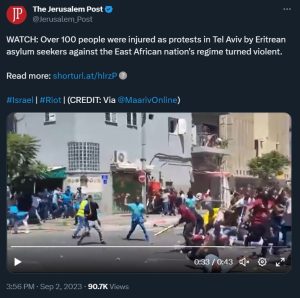
Later reports indicated that some 50 members of the police force had been injured, including one seriously, and Israel’s public broadcaster Kan 11 later released footage of one of the pro-regime Eritreans brandishing a gun.
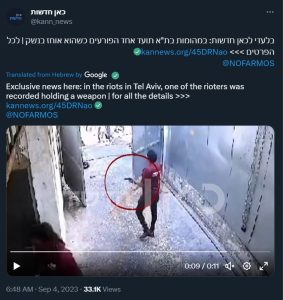
As reported by local media outlets, similar incidents took place on the same day in Norway and Switzerland.
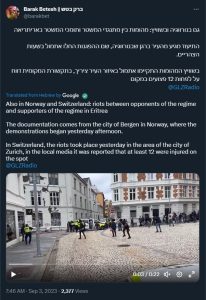
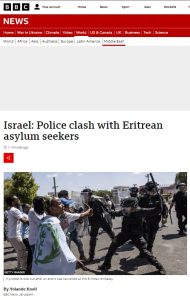
Early on the evening of September 2nd (Israel time) the BBC News website published a report by Yolande Knell headlined “Israel: Police clash with Eritrean asylum seekers”. Over the next three and a half hours or so that report was amended twice but the misleading headline remained in situ. Only on the following day – some seventeen and a half hours after the report’s initial appearance – was that headline changed to read “Israel: Police clash with rioting Eritrean rivals”.
Despite that amendment to the headline, the opening paragraphs of that report still inform BBC audiences that: [emphasis added]
“Dozens of people have been injured, including some from live gunfire, during clashes between Eritrean asylum seekers and Israeli police in Tel Aviv.
Stun grenades, tear gas and sponge-tipped bullets were used against hundreds of protesters.”
The report goes on:
“The unrest was sparked after activists opposed to the Eritrean government said they asked Israeli authorities to cancel an embassy event on Saturday.
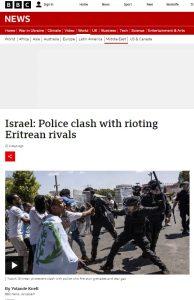
But protesters also clashed with supporters of the Eritrean regime.”
Interestingly, the synopsis to a filmed report on the same topic that was published on the BBC News website on the evening of September 2nd – and which appears at the top of both Knell’s reports – states:
“Police said they fired live rounds in the air, and used stun grenades and tear gas to disperse supporters and opponents of the Eritrean government.” [emphasis added]
Subsequent passages in Knell’s report nevertheless indicate that she is aware of the wider background to this story:
“The divisions within Eritrea over the rule of President Isaias Afwerki have spilled over into the diaspora, and this is the latest outbreak of violence in recent weeks. […]
As Eritrea marks 30 years of independence from Ethiopia, festivals have been held by its diaspora.
But as well as Israel, some in Europe and North America have been marred by protests and outbreaks of violence – last month a three-day Eritrean cultural festival in Toronto, Canada was cancelled after supporters and opponents of Eritrea’s regime clashed.”
That incident in Toronto was reported by the BBC on August 8th as follows, although the item does not appear on the BBC News website’s ‘Canada’ page:
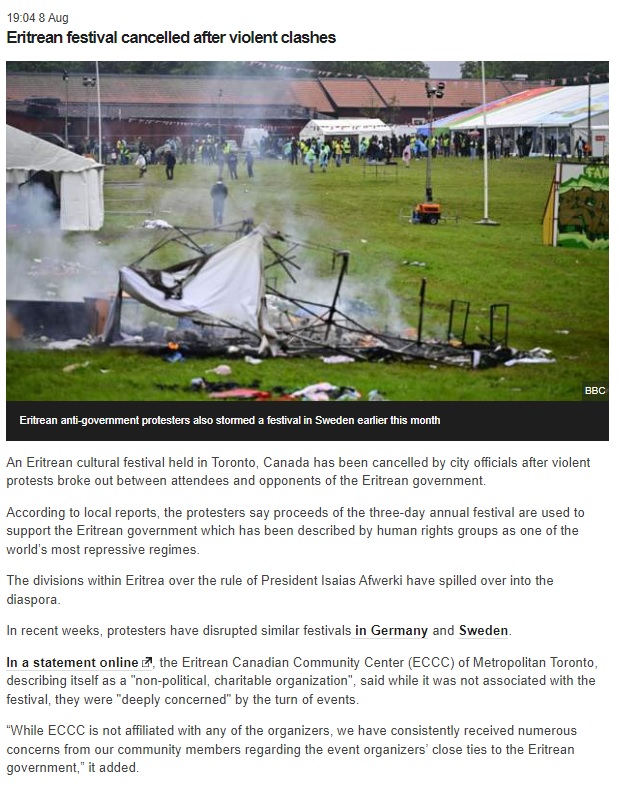
The headline of a short BBC report on a similar incident in Germany in July focused audience attentions on injuries to the local police force:
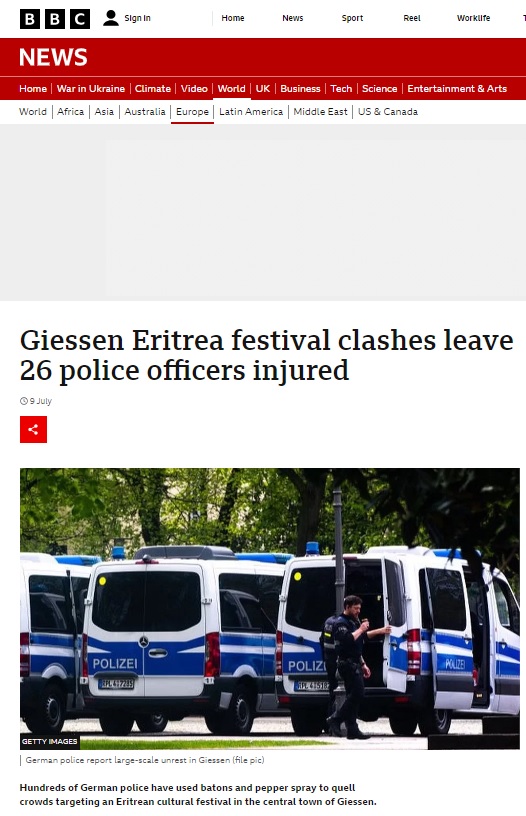
Another incident in Sweden in early August was reported by the BBC as follows:
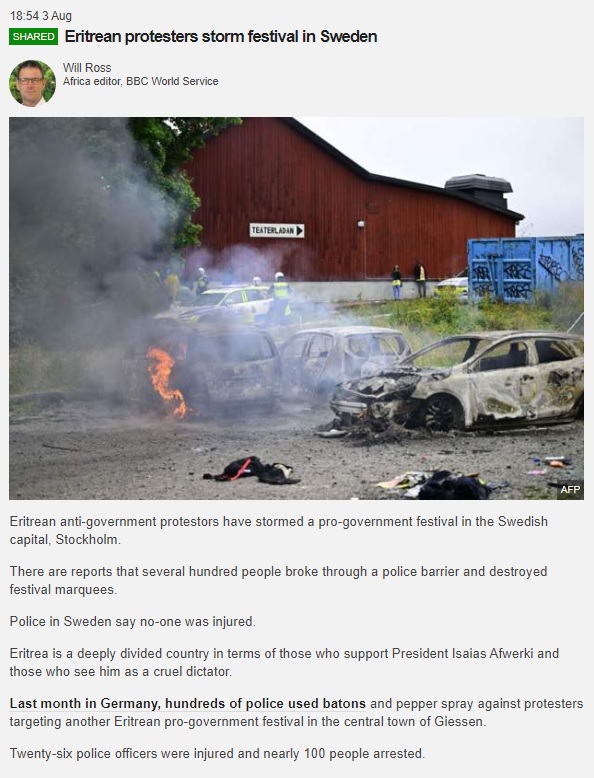
The rioting by Eritreans in Switzerland and Norway on the same day as the incidents in Tel Aviv does not appear to have been covered by the BBC News website.
Several hours after the headline to Knell’s September 2nd report had been amended on the morning of September 3rd, the BBC News website replaced that article with another – also written by Knell – titled “Israel: Netanyahu wants immediate deportation of Eritreans after Tel Aviv violence“.
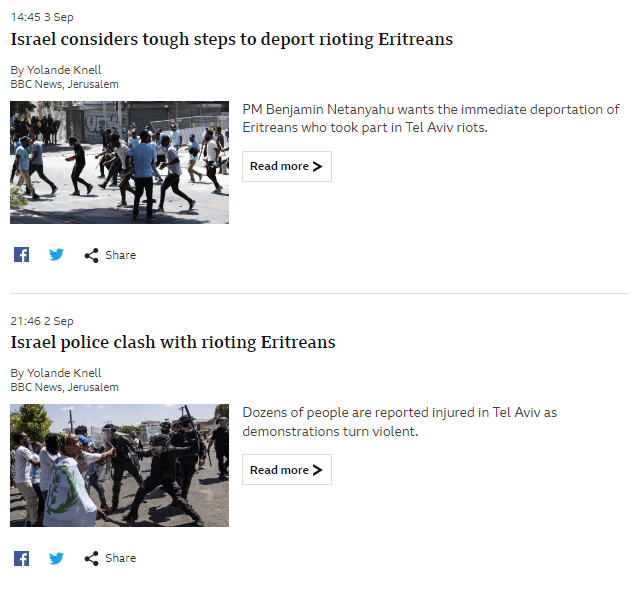
In that second report Knell does not make any effort to provide BBC audiences with more extensive background than that which appeared in her first article on the topic of how politically opposed groups of Eritreans come to be found in Israel and in other countries where similar incidents have been seen – and reported by the BBC – in recent weeks.
Rather, she focuses audience attentions on the topic of internal Israeli politics: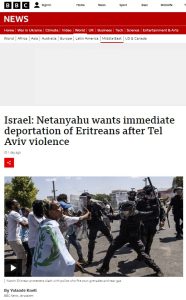
“The rioting has put the divisive issue of migrants back on the political agenda, at a time when Israel is already split over the hardline government’s highly controversial judicial overhaul plan.
Mr Netanyahu and others in his cabinet have blamed the Supreme Court for blocking earlier attempted action to push migrants out of Israel.”
Knell did not make any effort to inform her readers that such claims concerning the Supreme Court’s rulings on African migrants are inaccurate.
As we see, in less than a day the BBC News website produced two reports on the same story which is considerably more coverage than was given to similar events in other countries. That reporting shifted from the presentation of violence between two opposing groups of Eritreans as being a story about the Israeli police ‘clashing’ with “asylum seekers” to a story about the potential deportation of “asylum seekers” (despite the BBC having stated in 2015 that it would use the term migrants “to refer to all people on the move who have yet to complete the legal process of claiming asylum”). Despite the volume of coverage, clearly visitors to the BBC News website were not provided with the “range and depth of analysis” that would facilitate their understanding of this story.

